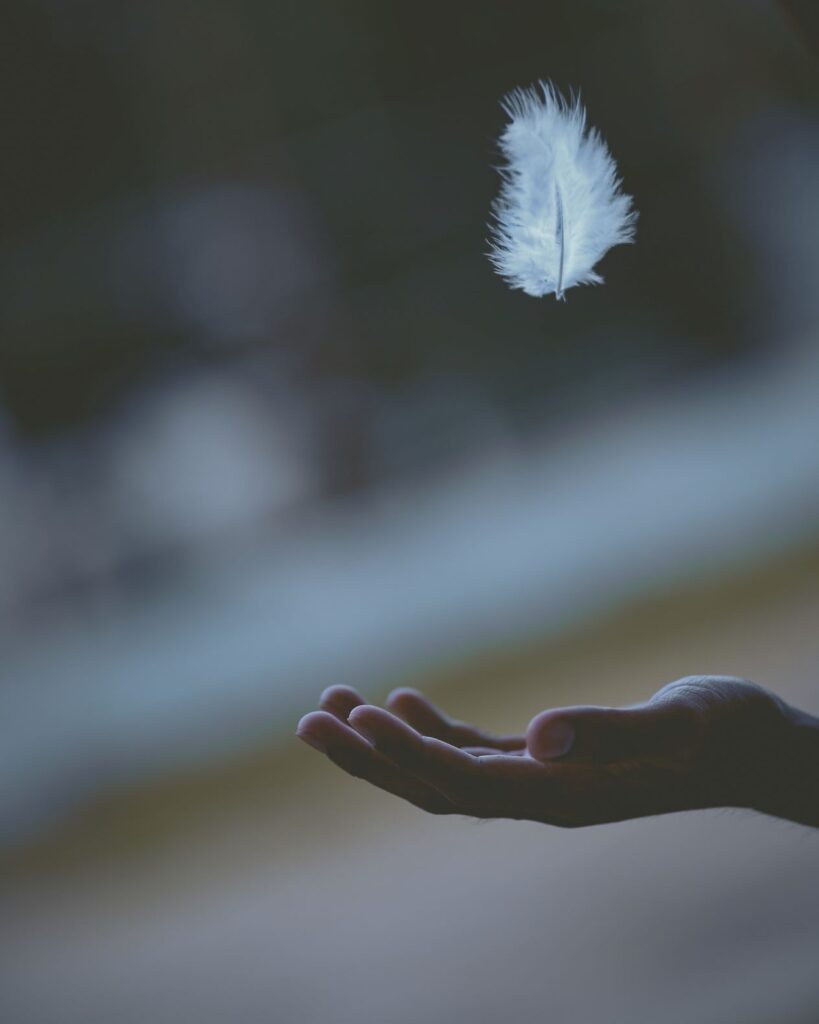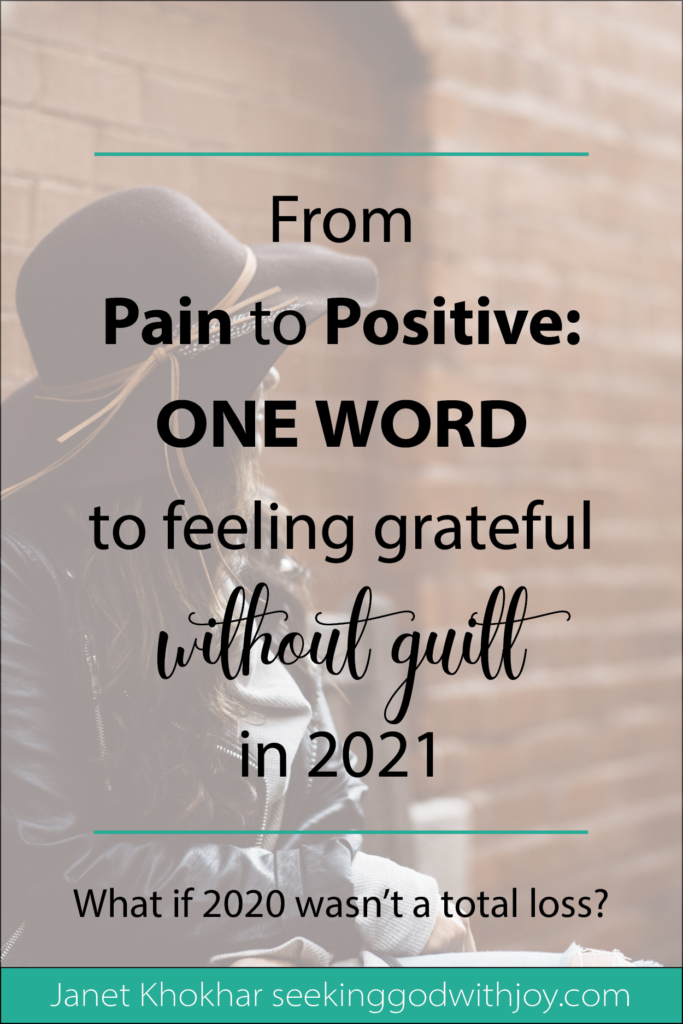
How many of us wished we could’ve pulled off a Rip van Winkel and slept through 2020?
When 2021 approached and the Christmas gifts were opened and the fruitcake eaten, then the emojis started. Push 2020 off the screen. Burn 2020. I’m sure there was a poop emoji somewhere.
We awoke on January 1, 2021, confident that this year had to be better than the wasted year behind us. Right?
But wait: what if you’re secretly grateful for 2020 because good grew from the ashes of a lost year, and now you feel guilty for your secret love affair with 2020?
Are we afraid to even speak it, as if saying “thank you” would erase the pain? We feel guilty for feeling grateful for 2020. We could count 2020 not as wasted, but simply as wounded. And what do we do with wounds? We heal them. What do we do with wonderful? We’re grateful. Wonderful, wounded, guilty, grateful. The push-pull will give you whip lash.
But what if I could give you one word that would take back 2020, whether your year was wasted or secretly wonderful?
Breaking the cycle is as simple as a three-letter word.
Many people choose a word of the year, but I didn’t discover my 2020 word until the last few months, and I’ve decided to hold onto it for 2021. It’s my banner going forward. This is the word of resilience, gratitude without guilt, and redeeming lost years.
The word is AND. And here’s why…
I’ve been dreaming of home life since I was a kid. While classmates and cousins dream of becoming doctors, police officers, and president of the United States, I hadn’t a clue. All I knew was that I was creative, sensitive, enormous (I’m 6’1” now), and I wanted to say “I do” and have a farmhouse full of kids.
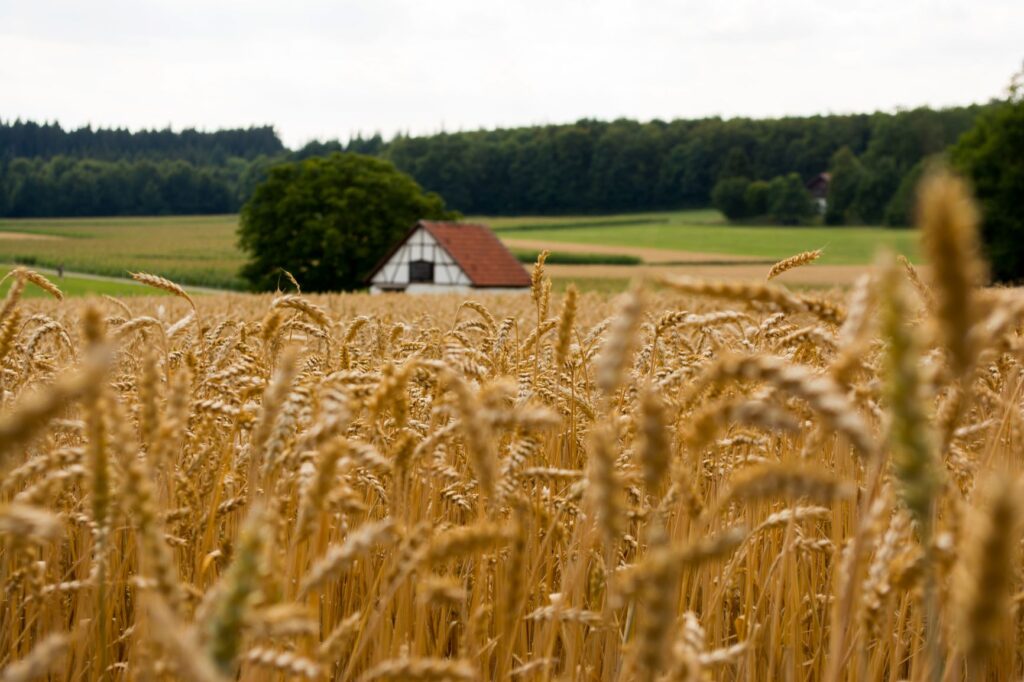
And I was going to homeschool my bunch of brats so they wouldn’t have to experience the emotional pain I went through in public school.
But. Six years ago, my then-two-year-old son Luke was diagnosed with autism. We left the developmental clinic at Children’s National Medical Center with referrals to Kennedy Krieger for an in-depth autism evaluation and to our local Infant and Toddlers Program.
Infants and Toddlers loved on my son and helped him overcome his hesitation to get paint on his hands (sensory stuff, although I think they created a monster judging by the “art” on our walls). Then he was shuttled into the Early Intervention Program. He loved the yellow school bus with its friendly driver, big tires, and – best of all – bi-fold swinging door.
When it was time to decide on kindergarten at homeschool or with the county’s SOAR autism program, that ball – I mean bus – was already rolling. His teachers doted on him, no one bullied him, and he climbed on that bus every day without a backward glance. I waved at him every day for years as the bus pulled away, but he rarely did more than look back at me.
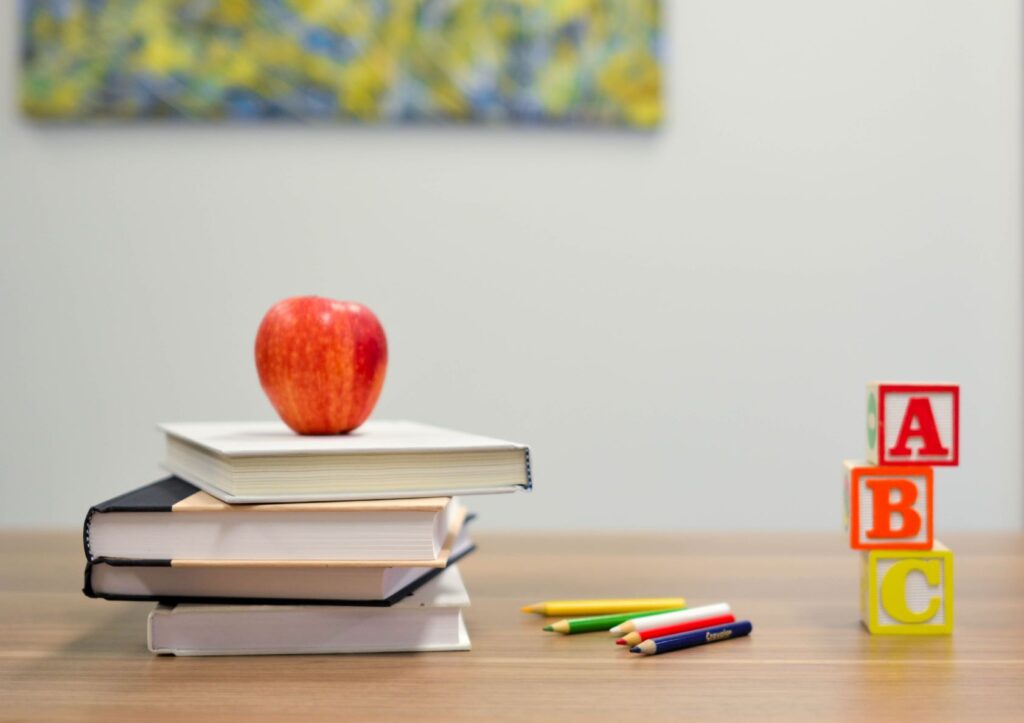
He seemed fine. And he was, all the way through second grade until March of you-know-what. You know, the month we parents all became part of the homeschool club that has two main divisions: Optimistic and Drag-Me-Kicking-and-Screaming. I was part of the first club. For about one day. I had more respect than ever for my son’s teacher and aids. Luke had ADHD to go with that autism, and he would much rather roam my parents’ three acres and throw rocks in that glorified-ditch-slash-excuse for a creek. So would I.
And I, like many parents, did my best to educate my unwilling learner while hoping schools would be reopened sooner rather than later. But by now I was firmly in the latter homeschool club: DMKaS. Oh, and I decided to start my five-year-old son, Elias, in kindergarten homeschool, too.
I researched curriculums, hired a special needs consultant to help me put together a program, bought brightly colored pencils and markers. I even crafted a picture schedule. We three homeschoolers – Luke, Elias, and Mommy – met the first day of homeschool with optimism.
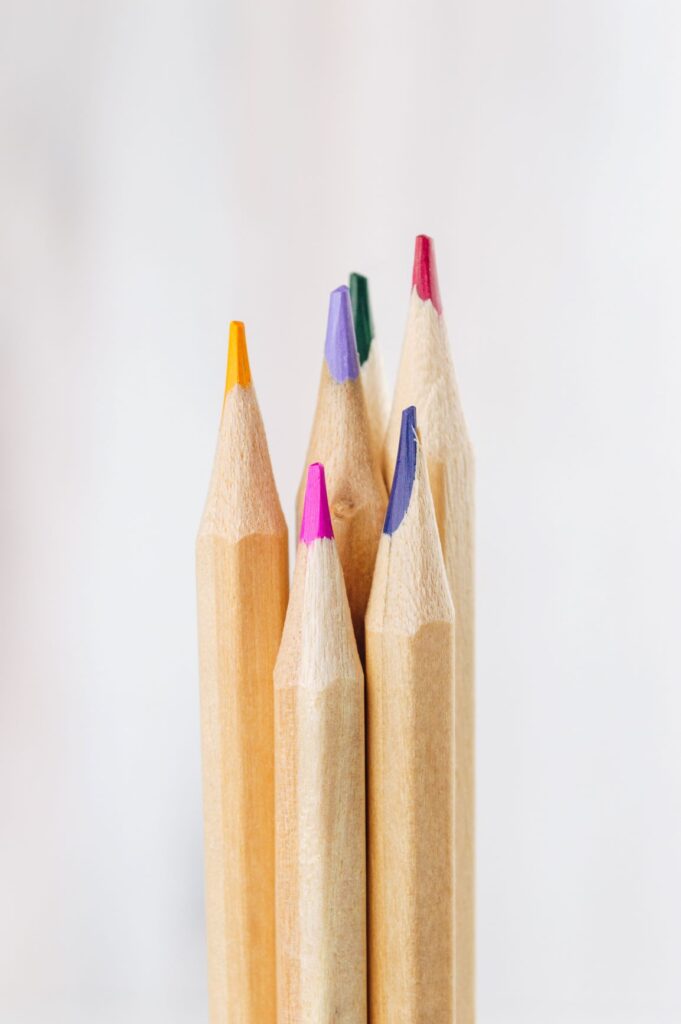
I wanted so badly to love teaching. I wanted them to sit nicely for their lessons. I wanted them to drink up learning like a soda.
At the end of the first day, Elias asked: “Is this the end of our school?”
“No, honey, we have a long way to go. Months and months.”
“You mean there’s more!” He exclaimed. This wasn’t really a question so much as an accusation.
I admitted to myself that I didn’t light up at the opportunity to educate fresh, young minds. I gathered our phonics book and letter tiles with as much enthusiasm as sitting down in the dentist’s chair. I couldn’t fake an all-is-well attitude with fellow homeschool moms whose kids were past the tough early stages, or had accepted their lot in life and completed assignments without complaint.
I was discouraged, with long months of homeschool stretching out ahead. Could I do this? Was it worth it? While not ready to quit, I was prepared to be miserable. (Post continues after subscribe box.)
This is when AND worked its magic.
Some days I almost cried at the homeschool chaos AND Luke learned vocabulary faster than ever.
My lessons seemed too short and the boys had a lot of time to fill AND Luke climbed on my lap and cuddled, something that was as rare as finishing his dinner.
I loathed committing to a schedule AND I showed up for my kids.
There’s another three-letter word more often used to connect an unpleasant or painful experience to a positive outcome: but.
But is not my favorite word for this situation, although Elias enjoys spelling it with an extra T on our dry erase board.
But is an about-face maneuver that puts two events into conflict.
Your husband broke your heart when he left, but if he hadn’t left, then you never would have made the changes that led to your breakthrough in emotional and physical health.
The pandemic took a slice out of your income, but you wouldn’t have felt empowered by your new-found budgeting skills without a job loss.
You’ve suffered a painful medical condition for years, but you wouldn’t have developed a deep well of compassion for other hurting people without going through the hurt yourself.
Whenever people offer those but statements, they say it with a wrinkle between their eyebrows and their gaze wanders to the middle distance. Not quite a soldier’s thousand-yard stare, but close.
We give more emphasis to what comes either before or after but – whatever negative circumstance pained us – and we feel the imbalance: The loss and the gain feel like they shouldn’t be reconcilable; the enemies should never meet under a white flag.
A but statement cost the lives of most of the Israelites who left Egypt. After God rescued them from slavery using visible power – ten plagues, a parted sea, and His presence in the form of cloud and fire – the Lord brought the people to the edge of the Promised Land. Moses appointed 12 men, one from each tribe, to spy out the land.

This mission was meant to be a sneak preview, a joyous observation of a great gift from their heavenly Father. But.
Thus they told him, and said, “We went in to the land where you sent us; and it certainly does flow with milk and honey, and this is its fruit. “Nevertheless, the people who live in the land are strong, and the cities are fortified [and] very large; and moreover, we saw the descendants of Anak there.
“Amalek is living in the land of the Negev and the Hittites and the Jebusites and the Amorites are living in the hill country, and the Canaanites are living by the sea and by the side of the Jordan.”
Then Caleb quieted the people before Moses and said, “We should by all means go up and take possession of it, for we will surely overcome it.” But the men who had gone up with him said, “We are not able to go up against the people, for they are too strong for us.”
Numbers 13:27-31 NASB (emphasis mine)
Only two men – Joshua and Caleb – trusted God to give them this good land despite the obstacles and overwhelming odds against them. The remaining 10 explorers chose but. Oh, the report started well. They threw an and statement in there:
We went in to the land where you sent us; and it certainly does flow with milk and honey, and this is its fruit.
Verse 27 (emphasis mine)
If not for the next statement, Israel would have walked into their new homeland within six weeks of leaving Egypt. But if you’re familiar with this story, then you know it doesn’t end with rest and fruitfulness, but with a desert detour 40 years long.
“Nevertheless, the people who live in the land are strong, and the cities are fortified [and] very large; and moreover, we saw the descendants of Anak there.”
Verse 28 (emphasis mine)
Nevertheless, like but, is a change in direction, an about-face maneuver pitting despair against hope. Joshua and Caleb intervened to restore the people’s confidence in the God who had brought them out of Egypt only weeks ago. A chance still remained to change but to and:
Then Caleb quieted the people before Moses and said, “We should by all means go up and take possession of it, for we will surely overcome it.”
Verse 30 (emphasis mine)
AND take possession of it. This should have been the end of the desert and the beginning of delight in their new home. It’s heartbreaking how close they came.
But the testimony of two men did not overcome the bad report of the other 10, and the people chose to believe the but statement and fell away in despair. Their bodies fell in the desert. Only Joshua and Caleb – the AND men – would enter the Promised Land 40 years later.

The Israelites chose to believe what came after but – we cannot overcome the giants of Canaan – rather than what came before: a good land and a great God.
And invites us to neither discount the bad nor dismiss the good. We can welcome the benefits without feeling guilty for their cost. That’s the beauty of and.
Jesus, too, understood this balance: what comes before may be painful – even agonizing – and what comes after is still good. Still good.

Paul wrote this about Jesus: fixing our eyes on Jesus, the author and perfecter of faith, who for the joy set before Him endured the cross, despising the shame, and has sat down at the right hand of the throne of God. Hebrews 12:2 NASB (emphasis mine)
For the joy.
I don’t believe that Jesus’ joy lessened His pain one iota. But the product of the cross – Jesus’ joy in offering payment for our salvation, and His triumphant return to the Father’s side – redeemed the pain. The pain didn’t erase the joy; it led to it. We err when we don’t joy in what the pain has produced, even if we would never have chosen to endure the pain.

Please don’t get me wrong: I’m not minimizing the profound pain many of you have slogged through, leaving your heart in shreds and your endurance at its human limits. Did you lose a child? God sees you. Did you lose your home? He sees you. Did your spouse renounce Christ? God sees you.
God redeems broken things, but sometimes we let the bad overshadow the good with but. We feel guilty for feeling joy at an unexpected outcome. That’s but sneaking in. Let’s not be but people — let’s be and people.
And if God brought about good from evil, joy from sorrow, then – for the joy – don’t feel guilty, feel grateful.
Did you lose a child and descend into a depth of peace in Jesus you never knew existed? Grieve without guilt for the gratitude of the gift that came after.
Did you lose your home and later find fulfillment in a home-building nonprofit where your story makes your clients feel comfortable?
Did your spouse renounce Christ and, in praying for him, made your marriage stronger than ever?
That’s the redeeming power of and. Grief with gratitude, and gratitude without guilt.
If but is an about-face maneuver, an either-or scenario, then and is a bridge holding hands with then and now, before and after, allowing them to be, if not friends, at least respectful competitors.
As I type this, I’m apprehensive about today’s bout with homeschooling. Dragging the boys away from their fun to practice letter sounds – er, ch, b versus d – I’d rather remain in the quiet.
And in a little while, I’ll grab our Bible, round up my boys and press on toward the good.
